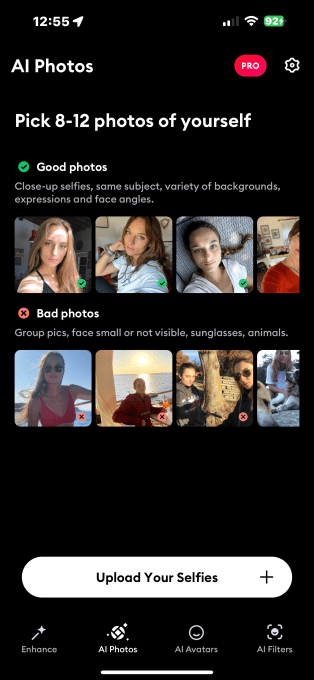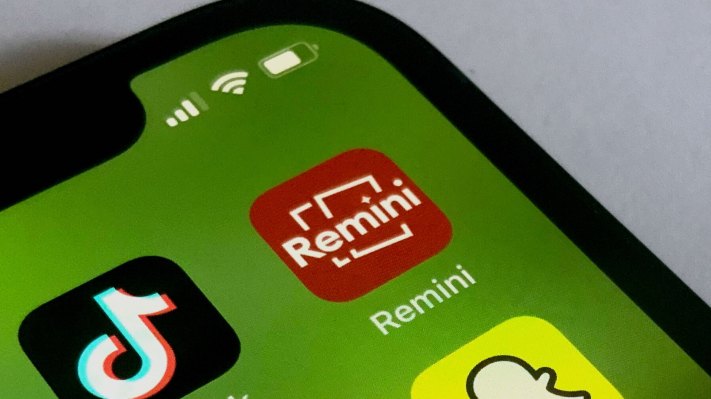Instagram’s Threads’ time at the top of the App Store has come to an end, thanks to an AI photo editing app called Remini that’s going viral on TikTok. First launched in 2019, the app added a generative AI feature last year which TikTok users have recently discovered allows them to create professional headshots for sites like LinkedIn just by uploading their own selfies.
In one video by TikTok user @Gracesplace, for example, the creator shows off how she submitted selfies to create a handful of professional-looking headshots that shows her in different outfits and poses. The video has since blown up on TikTok, now topping 42.9 million views.
@gracesplace #CapCut #ai #remini #fypシ ♬ 3:15 (Slowed Down + Reverb) – Russ
As others replicated her experience, demand for the AI photo app sent it soaring into the No. 1 Overall position on the U.S. App Store on July 11th, overtaking Instagram Threads only days after Meta’s popular new Twitter competitor launched, according to data from app analytics firm Apptopia. Over the past 30 days, Remini has seen 22+ million worldwide downloads. As of yesterday, the firm estimates the app was seeing over 20 million daily active users.
Another analytics firm, data.ai, saw Remini take over Threads on July 10th. In the U.S., Remini saw 2,131,000 U.S. downloads across iOS and Android in the past 10 days, it also found. From June 9-15, data.ai estimates Remini made $3,730,000 in consumer spending, a 1,055% week-over-week increase.
On the U.S. App Store, Remini has a 4.6-star rating across 124,000 reviews.
To create the AI headshots, users have to first pick eight to 12 photos of themselves, including close-up selfies featuring a variety of backgrounds, expressions and face angles, and then select their gender. You’ll pick out a “model” image that shows the overall style and composition of the photos you want generated. To generate professional shots, there are a number of options available under the subheading “curriculum,” but other styles are available, like “trendy,” “travel,” “casual” and the questionable “Korean aesthetic,” among others.

The AI will take several minutes to generate the shots. When complete, you can swipe left and right as you view the results — similar to how you like or dislike your possible matches on Tinder.
This process is reminiscent of another AI photo app that also went viral on TikTok last year: Lensa AI, which used your own photos to create “magic avatars” — or artistic renderings of users’ own images. However, that app raised alarm with artists who said the app was using their art as its training data. In addition, users found they could generate NSFW images with the AI.
Similar to Lensa AI, Remini’s app is also a free download, but using its full set of features requires a subscription. Currently, it’s priced at $9.99/week or $79.99 per year. (Likely, some users have been working around the payment requirement by starting a free trial, generating their AI images, then canceling their subscription.)
As the Remini headshots trend blew up on TikTok, some users were unhappy with the app’s AI results. Many people found the app was making unwelcome adjustments to their bodies in the resulting photos. For instance, some women remarked the app was making them much skinnier while others noticed it was greatly enhancing the size of their breasts or cleavage.
“All I wanted were some linkedin head shots [sic],” wrote TikToker @juliak528 in her video. “Why did AI give me a boob job,” the video description read, followed by crying emojis.
“No one talks about how dangerous this AI trend is for your mental health and body dismorphia [sic],” noted TikToker @spookyhorrorqueen, commenting on how the AI was returning photos showing a differently-sized body.
“The viral AI headshot filter made me about 105lbs and just…its bad,” added another creator, @northstarnotes, after the AI photos made her body smaller.
Others, however, said they were using their AI “skinny” photos as weight loss motivation.
Milan-based Remini was not immediately available for comment regarding whether it was working to address the mistakes the AI was making. After publication, the company shared the following information: that it had seen 40 million downloads from July 2-15, for starters. In addition, the company addressed the issues with the AI, saying:
We believe an important reason why Remini has been so successful is that it gives users the ability to truly recognize themselves in the AI-generated photos. While we know this is true in the vast majority of cases, on some occasions, the body types in AI photos are not an exact representation of the user’s body type – this isn’t our intention. Should this occur, we encourage users to try and upload different selfies, or experiment with different reference images from our gallery. Guided by our internal testing and by the feedback of our users, we are continuing to refine our AI technology to minimize the chances of this occurring
There are other concerns with the app as well, as some users thought the AI results were good enough that it didn’t make sense to pay a photographer for professional photos — something that speaks to the broader implications of easily accessible AI technology.
According to Remini’s website, generative AI photos of yourself aren’t the app’s only selling point. The app can also be used to restore old photos by adding detail, enhance face quality, improve the colors and tones of photos, enhance the background, and more. On the App Store, Remini also promotes it has the option to use an Official Barbie filter on your selfies, to turn your photos into those inspired by the new Barbie movie.
Updated, 7/21/23, 12PM ET with comments from Remini
